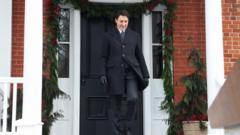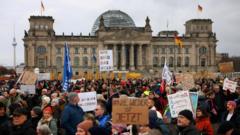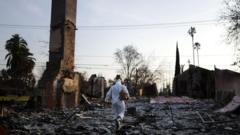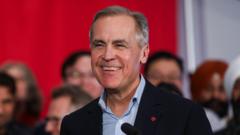Trudeau's inability to connect with voters and internal party discord precipitated his resignation, signaling a shift in Canadian politics and the quest for new leadership.
**The End of an Era: Trudeau Resigns as Prime Minister Amidst Growing Discontent**

**The End of an Era: Trudeau Resigns as Prime Minister Amidst Growing Discontent**
Justin Trudeau steps down after nine years, marking the end of his tumultuous tenure as Canada’s Prime Minister.
In a monumental shift in Canadian politics, Prime Minister Justin Trudeau announced his resignation from both the position of Prime Minister and leader of the Liberal Party, a role he has held for nearly a decade. His resignation comes amidst growing discontent among voters and rising calls from within his party for a change in leadership. Trudeau's decision, made in front of Rideau Cottage, his official residence, marks the closing chapter of a tenure that was once celebrated for its progressive initiatives but has seen a downturn amidst scandals and political miscalculations.
Throughout recent months, Trudeau faced incessant inquiries about his plans for stepping down, and despite his earlier commitments to remain in power, he acknowledged that his prolonged internal battles within the Liberal Party rendered him unable to be the best option for the next election. "This country deserves a real choice in the next election," he stated, emphasizing the need for a fresh perspective in leadership.
Trudeau first gained power in 2015, successfully leveraging his youthful charisma to shift the Liberals from third place to a parliamentary majority—an unprecedented achievement. Now, however, he finds himself as the last standing leader from an era that included political heavyweights such as Barack Obama and Angela Merkel. Trudeau's lengthy stay in office was marked by a rich tapestry of achievements, notably in indigenous reconciliation and responses to climate change. Yet, throughout his premiership, a myriad of scandals—including accusations of ethical misconduct and handling of a corruption inquiry—diminished his shine.
The turning tide began around 2019 when the Liberals lost their majority status and faced mounting pressure from the electorate. Issues like the rising cost of living and perceived incompetence in addressing immigration policies further eroded public trust in his administration. The failure of his cabinet shuffles and proposals to ease inflation did little to restore voter confidence.
In a stark indicator of his waning support, special elections over the summer resulted in Liberal losses in strongholds, sparking internal unrest within the party. Polls reflected this discontent, revealing a significant decline in approval ratings for the party, the lowest since 2014. As Conservative leader Pierre Poilievre gained ground, Trudeau still attempted to maintain his leadership, even in the face of electoral challenges posed by Trump's tariffs on Canadian goods.
The resignation of Chrystia Freeland, his former deputy and Finance Minister, served as a pivotal moment, underscoring the seriousness of the crises within his government. Her departure echoed the sentiment of a party slowly losing faith in its leader. In stepping down, Trudeau concludes his time as one of Canada’s longest-serving prime ministers, leaving behind a legacy of both notable accomplishments and significant controversies that will shape the country’s future political landscape.
Throughout recent months, Trudeau faced incessant inquiries about his plans for stepping down, and despite his earlier commitments to remain in power, he acknowledged that his prolonged internal battles within the Liberal Party rendered him unable to be the best option for the next election. "This country deserves a real choice in the next election," he stated, emphasizing the need for a fresh perspective in leadership.
Trudeau first gained power in 2015, successfully leveraging his youthful charisma to shift the Liberals from third place to a parliamentary majority—an unprecedented achievement. Now, however, he finds himself as the last standing leader from an era that included political heavyweights such as Barack Obama and Angela Merkel. Trudeau's lengthy stay in office was marked by a rich tapestry of achievements, notably in indigenous reconciliation and responses to climate change. Yet, throughout his premiership, a myriad of scandals—including accusations of ethical misconduct and handling of a corruption inquiry—diminished his shine.
The turning tide began around 2019 when the Liberals lost their majority status and faced mounting pressure from the electorate. Issues like the rising cost of living and perceived incompetence in addressing immigration policies further eroded public trust in his administration. The failure of his cabinet shuffles and proposals to ease inflation did little to restore voter confidence.
In a stark indicator of his waning support, special elections over the summer resulted in Liberal losses in strongholds, sparking internal unrest within the party. Polls reflected this discontent, revealing a significant decline in approval ratings for the party, the lowest since 2014. As Conservative leader Pierre Poilievre gained ground, Trudeau still attempted to maintain his leadership, even in the face of electoral challenges posed by Trump's tariffs on Canadian goods.
The resignation of Chrystia Freeland, his former deputy and Finance Minister, served as a pivotal moment, underscoring the seriousness of the crises within his government. Her departure echoed the sentiment of a party slowly losing faith in its leader. In stepping down, Trudeau concludes his time as one of Canada’s longest-serving prime ministers, leaving behind a legacy of both notable accomplishments and significant controversies that will shape the country’s future political landscape.























